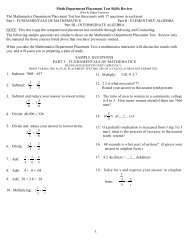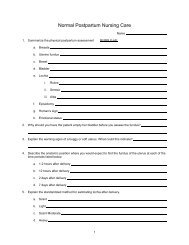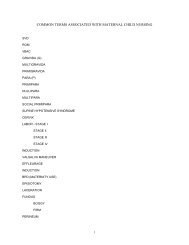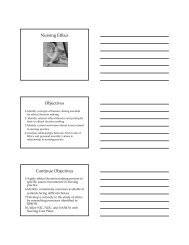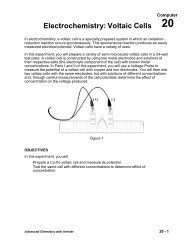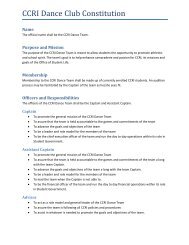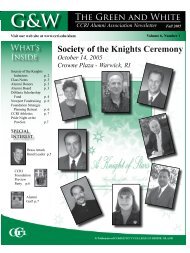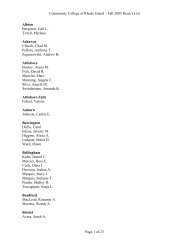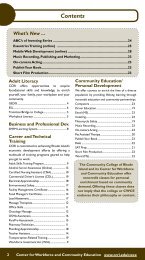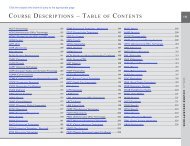Course Descriptions - Community College of Rhode Island
Course Descriptions - Community College of Rhode Island
Course Descriptions - Community College of Rhode Island
Create successful ePaper yourself
Turn your PDF publications into a flip-book with our unique Google optimized e-Paper software.
learn to cite their sources according to<br />
standard scholarly formats. Lecture: 1 hour,<br />
Lab: 1 hour<br />
LRCT 1015 - <strong>College</strong> Research -<br />
3 Credits<br />
<strong>College</strong> Research expands students’<br />
knowledge <strong>of</strong> various types and formats<br />
<strong>of</strong> information resources. Students<br />
learn information literacy skills including<br />
advanced search techniques and evaluation<br />
<strong>of</strong> resources. Students also gain a greater<br />
understanding <strong>of</strong> issues associated with the<br />
ethical use <strong>of</strong> information. Students demonstrate<br />
the application <strong>of</strong> learned skills<br />
in research for class assignments, as well<br />
as for personal and pr<strong>of</strong>essional research<br />
needs. Lecture: 3 hours<br />
LRCT 1020 - <strong>College</strong> Success -<br />
3 Credits<br />
This course will give new students practical<br />
tips and strategies that will help them<br />
succeed in college. Emphasis is on attitude,<br />
study habits, time and stress management.<br />
In a setting <strong>of</strong> active and collaborative<br />
learning, students are engaged in a variety<br />
<strong>of</strong> instructional experiences, including<br />
discussions with reading, speaking, writing<br />
and listening assignments. The course will<br />
require the creation <strong>of</strong> a personal success<br />
plan that will include educational and<br />
career goals and will introduce and make<br />
use <strong>of</strong> the college’s resources and personnel.<br />
Lecture: 3 hours<br />
liBA (liBerAl ArTS)<br />
LIBA 1000 - The Learner’s Journey:<br />
Critical Thinking and Learning<br />
Strategies for <strong>College</strong> Students -<br />
3 credits<br />
This fully transferable, seminar-style course<br />
has been designed to help students maximize<br />
their effectiveness in the classroom,<br />
and, in turn, enhance their entire college<br />
experience. In The Learner’s Journey,<br />
students develop their critical thinking,<br />
reading and writing skills; acquire valuable<br />
strategies for analyzing course content<br />
and for expressing themselves more confidently<br />
and effectively; improve their writing,<br />
presentation, collaboration and research<br />
skills; and learn to make connections<br />
between courses in different disciplines.<br />
Through readings, discussions and active<br />
participation, students take ownership <strong>of</strong><br />
their education and find their voices as<br />
learners in a higher education environment.<br />
(Prerequisites: To be eligible for this course,<br />
students must have an English placement <strong>of</strong><br />
ENGL 1005 and/or ENGL 0890 or above.)<br />
Lecture: 3 hours<br />
LIBA 1010 - Cooperative Work<br />
Experience I - 4 Credits<br />
Cooperative work experience provides<br />
students with an opportunity to observe<br />
and participate in a work environment<br />
related to their academic interests or<br />
explore advancement in their current<br />
career. Students work approximately 15 to<br />
20 hours a week at an approved site for<br />
competitive wages and participate in a onehour<br />
and 40-minute weekly seminar on<br />
campus or online. Students must contact<br />
the CO-OP <strong>of</strong>fice before they register. Call<br />
CO-OP at 401-825-2050 or 401-333-7254.<br />
Note: LIBA 1010 for Allied Health, Chemical<br />
Technology, Computer Science, Engineering,<br />
Fine Arts, Fire Science, General Studies, Human<br />
Service, Industrial Technology, Liberal Arts<br />
Nursing, Paralegal Studies and Law Enforcement<br />
(195 hours work placement / 25 hours<br />
seminar. LIBA 1010-306 has LAWS 1100-306<br />
as a prerequisite)<br />
LIBA 1020 - Cooperative Work<br />
Experience II - 4 Credits<br />
This is an extension <strong>of</strong> LIBA 1010 in which<br />
students develop an in-depth knowledge<br />
<strong>of</strong> specific content areas and demonstrate<br />
increased levels <strong>of</strong> expertise. Students<br />
work approximately 15 to 20 hours a week<br />
at an approved site and participate in a onehour<br />
and 40-minute weekly seminar on<br />
campus or online. For information regarding<br />
prerequisites please contact CO-OP<br />
at 401-825-2050 or 401-333-7254. Note:<br />
LIBA 1020 for Allied Health, Chemical Technology,<br />
Computer Science, Engineering, Fine Arts,<br />
Fire Science, General Studies, Human Service,<br />
Industrial Technology, Liberal Arts, Nursing,<br />
Paralegal Studies and Law Enforcement (195<br />
hours work placement / 25 hours seminar)<br />
mApr (mAnufACTuring<br />
TeChnology)<br />
MAPR 1140 - Industrial Blueprint<br />
Reading - 2 Credits<br />
In this course, students apply technical<br />
drawing principles to the construction <strong>of</strong><br />
job sheets, assembly and detailed drawings.<br />
Dimensioning, notes, symbols, parts lists,<br />
specifications and the use <strong>of</strong> industrial<br />
tables are covered. Principles learned are<br />
applied in the interpretation <strong>of</strong> industrial<br />
prints related to the machine-tool industry.<br />
Lecture: 2 hours, Lab: 1 hour<br />
MAPR 1170 - Architectural Blueprint<br />
Reading - 2 Credits<br />
This course provides instruction in the<br />
basic skills needed to read, interpret and<br />
analyze blueprints that are used in civil<br />
engineering, commercial, residential and<br />
industrial building sites. The course stresses<br />
the need to apply these basic skills when<br />
reading differing types <strong>of</strong> prints used by<br />
the industry. Also addressed is the need<br />
to know the symbols, codes, specifications<br />
and abbreviations used in the construction<br />
trade, related to mechanical, electrical,<br />
plumbing construction specifications and<br />
project management. Lecture: 2 hours, Lab:<br />
1 hour<br />
MAPR 1200 - Lean Manufacturing -<br />
5 Credits<br />
This course examines the strategy to<br />
implement lean manufacturing and improve<br />
quality, cost and delivery. Students learn<br />
how to implement Kaizen principles. Focus<br />
Prerequisite: Successful completion <strong>of</strong> course required before registering. Corequisite: <strong>Course</strong> must be taken prior to or at the same time.<br />
lrct-liba-mapr<br />
is on preparatory steps taken to ensure<br />
achievable breakthrough goals and team<br />
success and on sustaining results. Lecture: 4<br />
hours, Lab: 2 hours<br />
MAPR 1220 - Tooling and Machining<br />
Operations - 8 Credits<br />
A continuation <strong>of</strong> ENGT 1020, this course<br />
meets the theory-related classroom<br />
requirement for precision metal-working<br />
apprentices. It also provides Manufacturing<br />
Technology degree or certificate students<br />
with broad exposure to as many machining<br />
setups and operations experiences as<br />
possible. Students acquire the knowledge<br />
and the skill needed in performing the<br />
safe operation and setup <strong>of</strong> conventional<br />
machine tools. The tool room lathe, the<br />
vertical milling machine and the reciprocating<br />
table surface grinder are studied<br />
in much greater depth. (Prerequisite: ENGT<br />
1020) Lecture: 3 hours, Lab: 10 hours<br />
MAPR 1240 - Computer Aided<br />
Manufacturing - 2 Credits<br />
A continuation <strong>of</strong> MAPR 1250, this course<br />
presents an overview <strong>of</strong> the s<strong>of</strong>tware and<br />
documents using MasterCam s<strong>of</strong>tware.<br />
Turning, milling and wire EDM methods <strong>of</strong><br />
machining are discussed and part programs<br />
are generated for the machining processes<br />
using this s<strong>of</strong>tware. Students are introduced<br />
to the most common types <strong>of</strong> machine<br />
tools controlled by a computer. In addition,<br />
students produce CNC part programs<br />
with the desired machining sequence and<br />
tool path verification using the s<strong>of</strong>tware.<br />
Text editing, tool path sequence and CNC<br />
file management are discussed. (Prerequisite:<br />
MAPR 1250 and COMI 1100) Lecture: 1 hour,<br />
Lab: 2 hours<br />
MAPR 1250 - Introduction to CNC -<br />
2 Credits<br />
This course introduces students to CNC<br />
manual programming techniques and<br />
familiarizes them with the most common<br />
machine tools used in industry that are<br />
185



